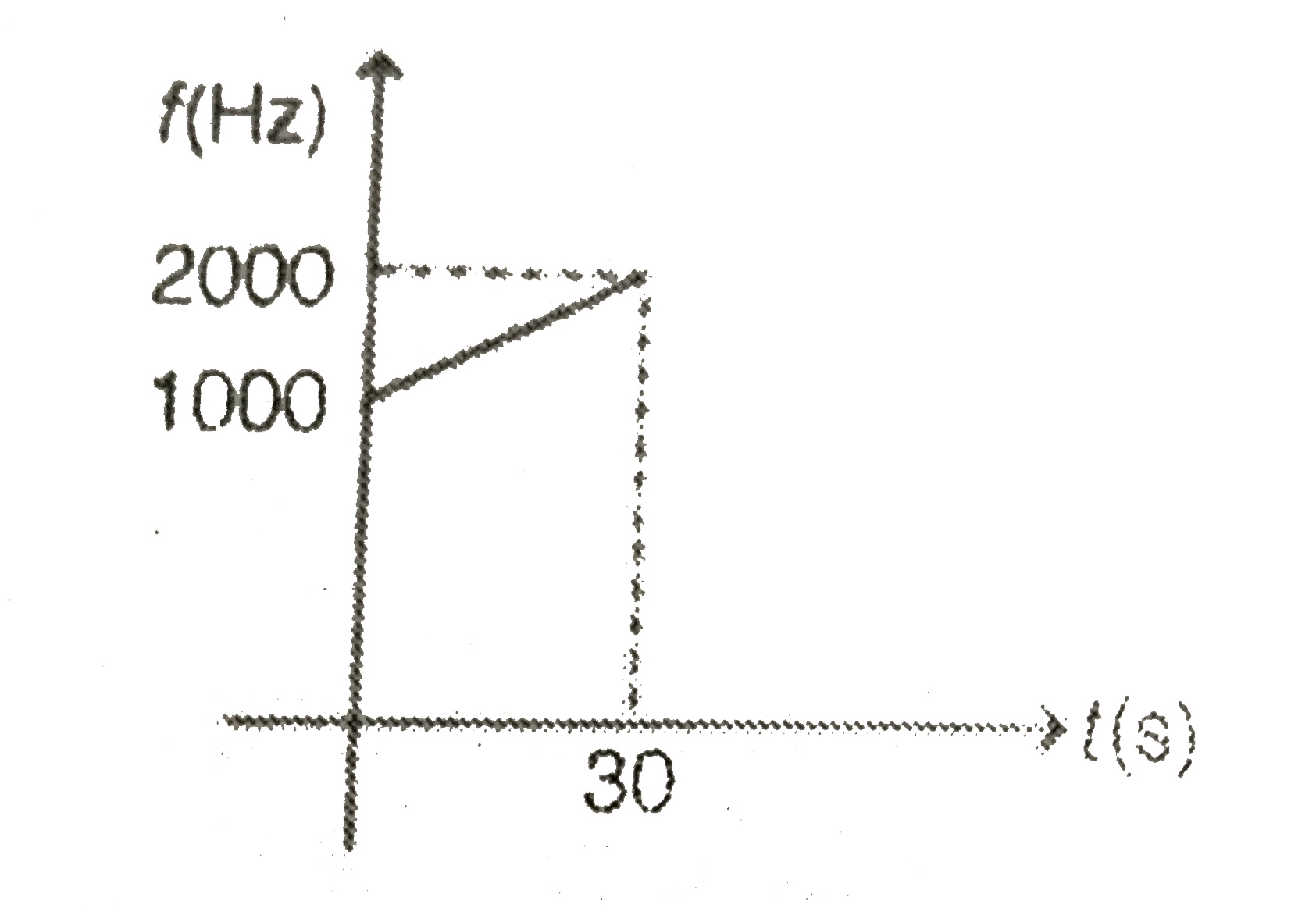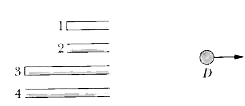Microwaves from a transmitter are directed normally toward a plane reflector. A detector moves along the normal to the reflector. Between positions of 14 successive maxima the detector travels a distance 0.14 m. The frequency of the transmitter is (c=3×108ms−1).
1.5×1010Hz
3.0×1010Hz
1.5×109Hz
3.0×109Hz
The correct Answer is:a
Detector receives both the direct as well as the reflected waves. Distance between two consecutive maxima =λ/2.
For 14 maxima, distance =14×λ2=0.14m
v=cλ=3×1080.02=1.5×1010Hz
Topper's Solved these Questions
- WAVE OPTICSBOOK - CENGAGE PHYSICSCHAPTER - WAVE OPTICSEXERCISE - Multiple Correct
8 Videos
- WAVE OPTICSBOOK - CENGAGE PHYSICSCHAPTER - WAVE OPTICSEXERCISE - Assertion- Reasoning
13 Videos
- WAVE OPTICSBOOK - CENGAGE PHYSICSCHAPTER - WAVE OPTICSEXERCISE - Subjective
11 Videos
- THERMODYNAMICSBOOK - CENGAGE PHYSICSCHAPTER - THERMODYNAMICSEXERCISE - QUESTION BANK
34 Videos
- WAVESBOOK - CENGAGE PHYSICSCHAPTER - WAVESEXERCISE - QUESTION BANK
38 Videos
Similar Questions
A boat is travelling in a river with a speed 2m/s. From this boat, a sound transmitter is lowered into the river through a rigid support. The wavelength of the sound emitted from the transmitter inside the water is 14.45mm. Assume that attenuation of sound in water and air is negligible.
(a) What will be the frequency detected by a receiver kept inside the river downstream?
(b) The transmitter and the receiver are now pulled up into air. the air is blowing with a speed 5m/s in the direction opposite the river stream. Determine the frequency of the sound detected by the receiver.
(Temperature of the air and water = 20^(@)C,Densityofriverwater= 10^(3) kg//m^(3),<br>Bk––modu––softhewater= 2.088 xx 10^(9)Pa,gasconstantR = 8.31 J//mol-K,<br>Meanmo≤ca––rmassofair= 28.8 xx 10^(-3) kg//mol,C_(P)//C_(V)forair= 1.4)
View SolutionA source of sound emitting a 1200 Hz note travels along a straight line at a speed of 170ms−1. A detector is placed at a distance of 200 m from the line of motion of the source. (a) Find the frequency of sound received by the detector at the instant when the source gets closest to it. (b) Find the distance between the source and the detector at the instant it detects the frequency 1200 Hz. Velocity of sound in air=340ms−1.
View Solution
Knowledge Check
Microwaves from a transmitter are directed normally toward a plane reflector. A detector moves along the normal to the reflector. Between positionsof 14 m successive maxima the detector travels a distance 0.14 m. The frequency of the transmitter is (c=3×108ms−1).
A1.5×1010HzB1010HzC3×1010HzD6×1010HzFrom a TV tower waves are sent normally to a plane reflector. A detector moves along this normal and covers a distance S between positions of first and nth successive maxima. Velocity of light in air is c, then probable frequency of TV waves is
A(n−1)2cSB(n+12)cSCncSD(n+1)3cSA detector is released from rest over a source of sound of frequency f0=103Hz. The frequency observed by the detector at time t is plotted in the graph. The speed of sound in air is (g=10m/s2)
 A330m/sB350 m/sC300 m/sD310 m/s
A330m/sB350 m/sC300 m/sD310 m/s
A boat is travelling in a driver in river with a speed 10m/s along the stream flowing with a speed 2m/s. From this, boat, a sounjd transmitter is lowered into the river through a right support. The wavelength of the sound emitted from the transmitter inside the water is 14.45mm. Assume that attention of sound in water and air is negligible.
(a) What will be frequency detected by receiver kept inside downstream?
(b) The transmitter and the receiver are now pulled up into air. The air is blowing with a speed 5m/s in the direction opposite the river stream. Determine the frequency of the sound detected by the receiver. (Temperature of the air and water =20∘C, Density of river water =103kg/m3. Bulk modulus of the water =2.088×106Pa, Gas constant R=8.31J/mol−K, Mean molecular mass of air =28.8×10−3kg/mol, CP/CV for air =1.4).
View SolutionA boat is travelling in a river with a speed 10m/s along the stream flowing with a speed 2m/s . From this boat , a sound transmitter is lowered into the river throught a rigid support. The wavelength of the sound emitted from the transmitter inside the water is 14.45mm . Aassume that attenuation of sound in water and air is neglisible.
(a) What will be the frequency delected by a receiver kept inside the river downstream ?
(b) The transmitter and the reciver are now pulled up into air. The air is blowing with a speed 5m/s in the direction opposite the river stream. Determine the frequency of the sound delected by the reciver.
(Temperature of the air and water = 20∘C , Density of river water = 103kg/m3 , Bulk modulus of the water = 2.088×109Pa , Gas constant, R=8.31J/mol−K , Mean molecular mass of air = 28.8×10−3kg/mol , Cp/CV for air = 1.4
View SolutionFigure shows four tubes with lengths 1.0 m or 2.0 m, with one or two open ends as drawn. The fifth harmonic is set up in each tube, and some of the sound that escapes from them is detected by detector D, which moves directly away from the tubes. In terms of the speed of sound v, what speed must the detector have such that the detected frequency of the sound from (a) tube 1, (b) tube 2, (c) tube 3, and (d) tube 4 is equal to the tube's fundamental frequency?

View SolutionA particular station of All India Radio,New Delhi, broadcasts on a frequency of 1,368kHz. The wavelength of the electromagnetic radiation emitted by the transmitter is: (speed of light, c= 3.0×108ms−1
View SolutionThe distance between two trucks moving towards each other is decreasing at the rate of 10m/s. If these trucks travel with same speeds in same direction the separation increases at the rate of 5m/s. The speeds of the trucks are :
View Solution
